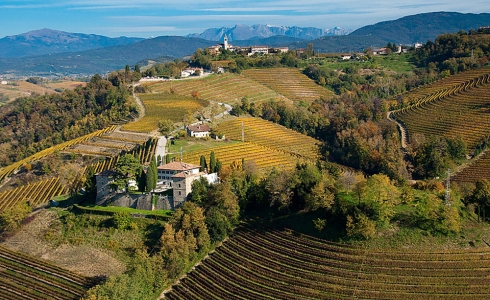

 Wine for Pastry?
Wine for Pastry?
We've found 18 wine(s) in our Italian Wine Guide which are good for Pastry.
Read more

Friuli-Venezia Giulia is the smallest of the so-called “Tre Venezie”, which includes the regions Trentino, Veneto and Friuli. The names ‘Friuli’ and ‘Giulia’ refer to Julius Caesar. ‘Friuli’ derives from the Latin ‘forum julii’, modern city Cividale, and Giulia derives from Julius (Caesar). Caesar’s armies conquered the area after long and hard battles, and after the victory, the emperor’s city of Aquileia became the second most important city of the Roman Empire.
The Friuli wines enjoyed moments of great recognition in the ancient world. The Roman historian Pliny the Elder praised in one of his songs the wine “Puleinum”, most likely the ancestor of the Prosecco sparkling wine, and in the 18th century most of the European courts had a taste for the wines made from the Picolit grape. Historical records indicate that a certain Fabio Asquini exported in that period up to 100,000 bottles of this type of wine per year.
The damage produced during World War I to many family farms and vineyards imposed extensive restoration and several young men from the farms had to go from town to town and from door to door selling bottles and demijohns of wine to local ‘trattorias’, ‘osterias’ and restaurants.
Since then, fortunately, things improved in the region and the Friuli wines are now the ones with the most revenue in Italy. It was also the Friulians who showed that young, quality white wines could and should be expensive.
Expensive Friuli white wine is not necessarily synonymous with exceptionally good white wine. In Italy, there is a tendency to consume white wine within six months after the harvest, which determines many manufacturers to be tempted to send the wine too early in the market. The wines are often sold and drunk before they have time to show their true strength.
Even in bad years, the wine reaches high prices and unfortunately the less serious producers profits from the situation. A growing number of consumers (including restaurants) are keeping their distance from these methods, yet top producer stocks are being sold out before the wine is bottled. Fortunately, the majority of Friuli winemakers are extremely serious.
Nearly 70% of the wine production is DOC and the yield per hectare is considerably lower than in, for example, Trentino and Veneto. The reason may be the care that many manufacturers provide for the crops daily and the fact that most of them work exclusively with grapes grown on their own land. These are among the factors that explain why the region has managed to sustain a reputation of high class. Some of their neighbors cannot quite live up to this.
As previously mentioned, Friuli is best known for white wine, which is of high quality in this area especially since the 1970s. Generally, white wines have a fresh scent; they taste of dry fruit, with a soft texture and a unique personality. Dessert wines such as Friuli-Venezia Giulia Picolit DOC and Friuli-Venezia Giulia Verduzzo DOC have great class. The Tocai types ares suffering abroad, unfortunately, still being confused with the Hungarian national grape, Tocὰji, but the two have nothing in common.
The Friuli wine list also includes interesting red wines. Previously, the region was known for soft, fruity, remarkable easy-drinking red wines, but in recent years, several manufacturers have produced wines with a weight and style that appeal to the international market.
The Merlot and the Cabernet wines (DOC in all zones) are dominant, as well as the local variety Refosco and the specialties Schioppettino, Pignolo and Tazzalenghe.
Roughly, Friuli can be divided into five zones: Friuli Grave DOC, Colli Orientali del Friuli DOC, Collio Goriziano DOC, Friuli Annia DOC and Carso DOC. The labels present the zone names, the majority starting with ‘Friuli’ in order to strengthen the regional identity.
Read more about the wines from Friuli-Venezia Giulia by clicking i the top menu in the right side.
That Italy in 2011 was the worlds largest wine producer?